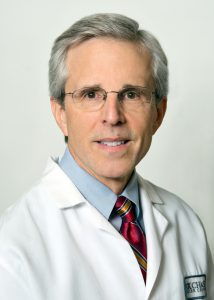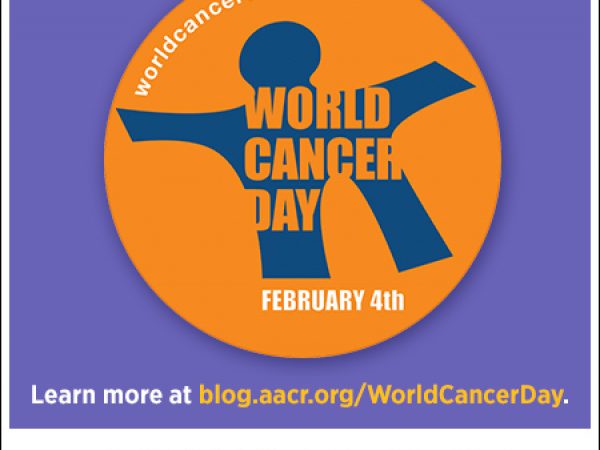Party with a Purpose to Raise Funds for the AACR
For the second consecutive year, the American Association for Cancer Research (AACR) has been designated the beneficiary of Party with a Purpose, a Philadelphia gala that raises funds for cancer research. This year, funds raised at the gala will be dedicated to ovarian cancer research.
 At the Oct. 22 gala, Stephen C. Rubin, MD, chief of gynecologic oncology at Fox Chase Cancer Center in Philadelphia, will receive the 2017 Scientific Achievement Award. He will then award a scientific grant to his colleague Gina Mantia-Smaldone, MD, a gynecologic oncologist who works closely with him at Fox Chase, balancing patient care with research interests in ovarian cancer.
At the Oct. 22 gala, Stephen C. Rubin, MD, chief of gynecologic oncology at Fox Chase Cancer Center in Philadelphia, will receive the 2017 Scientific Achievement Award. He will then award a scientific grant to his colleague Gina Mantia-Smaldone, MD, a gynecologic oncologist who works closely with him at Fox Chase, balancing patient care with research interests in ovarian cancer.
In a recent interview, Rubin discussed the progress that has been made in treating ovarian cancer, and discussed how ongoing research may further extend survival and improve quality of life for women facing this particularly dangerous type of cancer.
In your practice, what’s your balance between patient care and research?
It’s probably about 70 percent patient care, 20 percent research, and the remainder of my time is spent on administrative tasks. I’ve been very active in research, both translational and clinical, throughout my career. I’ve also been an active clinician. Taking care of patients has always been my first love in medicine.
How do you feel each area informs the other?
Being a clinician helps us know what sort of research is relevant to our patients. It’s always been a great help to me to understand the clinical care of the cancers that we’re conducting research on.
How did you choose to focus on gynecological cancer?
Gynecologic oncology is unique in the oncologic disciplines in that we practice multidisciplinary cancer care. Physicians and researchers talk a lot about the notion of multidisciplinary care, but in gynecology oncology, we actually do it, because we’re trained to do both surgery and chemotherapy to treat these cancers.
We also do longitudinal care, meaning that once we take on a patient with gynecologic cancer, we coordinate their care, including surgery and chemotherapy, over the course of their disease. That’s unusual among cancer disciplines. A lot of cancer care is more fragmented. If you have colon cancer, a surgical oncologist will perform your surgery. And then you’ll probably be sent to a medical oncologist who may do your chemotherapy, then perhaps a radiation oncologist who will do your radiation therapy. But in gynecologic oncology, we provide all stages of care, and that is very rewarding.
Does your work center on ovarian cancer, or the full range of gynecological cancers?
I practice the full scope of the specialty. My research interests have been primarily in ovarian cancer. It’s our greatest need in gynecological oncology. It’s not the most common cancer, but it’s the most difficult one to heal. Ovarian cancer causes more deaths in this country than the other gynecological cancers combined.
Over the past decade or so, what are some advances that you’ve seen in gynecological cancers?
There have been tremendous advances, both in the surgery and in the role of chemotherapy and targeted therapy. We have gotten much better at gauging the appropriate extent of the surgery. That’s been a great advance. And in the realm of chemotherapy, there have been amazing new developments even in the past five years. Today, we have effective targeted therapies, including three PARP inhibitors, a new class of drugs that we use for ovarian cancer, as well as anti-angiogenesis agents.
People have been talking for some time about turning ovarian cancer into a chronic disease, and I’ve always been rather cynical about that. But I think we are making progress and may be nearing that reality. Our average patient lives more than five years now, and some live much longer than that.
What are some research areas that you think will be worthy of exploring over the next five to 10 years?
I think we’ll be exploring systemic and targeted therapies more than surgery. Research so far has led us to change our practice on the timing of surgery, and I think we’ll continue to seek answers on how to combine chemotherapy and surgery.
In the past, in a typical case of ovarian cancer, we would operate first, and do a fairly aggressive surgery, to be followed by chemotherapy. But there’s more and more evidence that if we start with chemotherapy, perhaps for several months, and then operate, the surgery becomes easier for the patient, with an easier recovery and an outcome that is often just as good.
Are the targeted therapies available today more tolerable than chemotherapy was in the past?
Many of them are. The anti-angiogenesis agents we use are quite tolerable compared with conventional chemotherapy, and PARP inhibitors are typically oral drugs that are easier for the patient to tolerate.
At Party with a Purpose, you’ll be awarding a grant to your colleague Gina Mantia-Smaldone. Why is it so important to cultivate the careers of this upcoming generation of physician-scientists?
They’re the people who are going to move our field forward. The young people are our professional legacy. They’ll be here after we’re gone, making new advances and continuing to help patients. They need mentorship and guidance, and that’s one of the most important things the senior people in the field can do. Gina is an outstanding young academic gynecological oncologist, devoting a significant portion of her time to clinical research.
This is the AACR’s second year as a beneficiary of Party with a Purpose. We’re grateful for the support and the connection; what does the award mean to you?
It’s a wonderful thing to be recognized. It came to me out of the blue, and I am surprised and humbled to receive it. I’ve spent most of my career in Philadelphia, and this feels like a hometown honor.

Stephen Rubin, MD, and Gina Mantia-Smaldone, MD, who will win scientific awards at the Oct. 22 Party with a Purpose gala, place locks on the new Philadelphia Hope Fence. The fence was presented last week as a gift from Philadelphia philanthropists Sarah and Dan Keating. The Keatings, who will receive the 2017 Humanitarian Award at the Oct. 22 Party with a Purpose gala, invited the AACR to be a part of the announcement of the Hope Fence.



